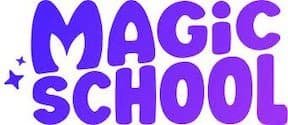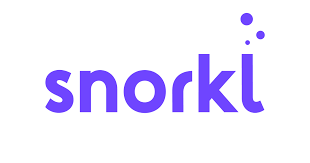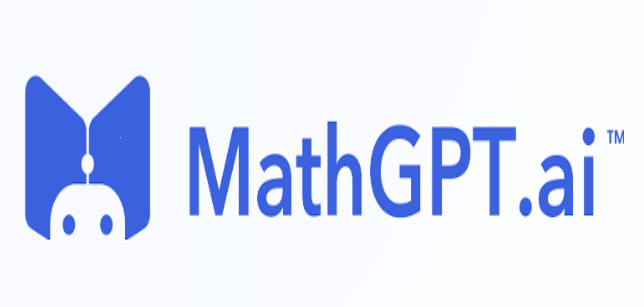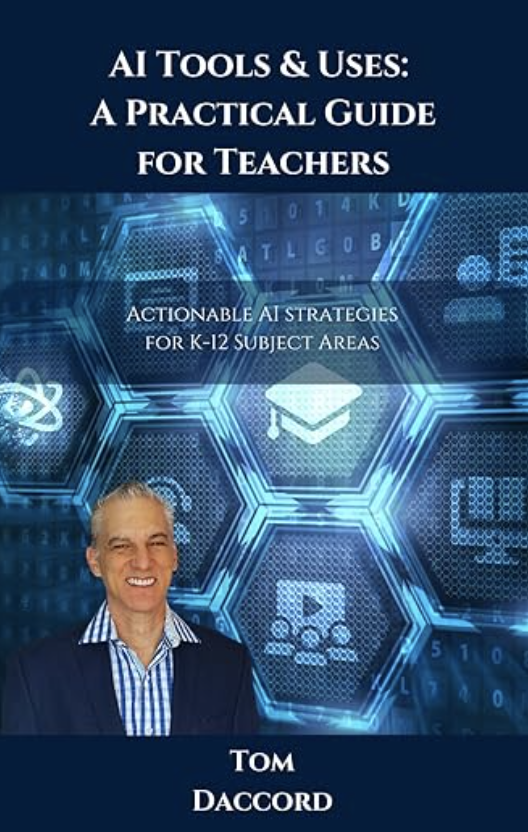
Tom Daccord
10,000+ Teachers Trained. 15 Years of Global Leadership. Let’s Transform Your AI Journey.
How do you pick the right AI tools for math? Joined by my wife, Edit Jimenez, I explore the 'sweet spot' where AI capabilities align with what math students need most.
How to Choose the Best AI Tools for Math Teaching
-

Gemini 3: (General) Advanced AI Model
Google recently introduced Gemini 3, its “most intelligent model,” to much acclaim. Gemini 3 is designed for deep, nuanced reasoning, and it has already beaten prominent Math performance benchmarks.
——
Features: Gemini 3 is an “advanced reasoning” model that considers multiple solution options and self-checks its problem-solving steps. As such, Gemini 3 can solve complex math problems and minimize errors. The Gemini 3 Pro model, in particular, is highly reliable for tasks from Algebra I to routine AP/IB Calculus applications. In all, Gemini 3 serves as a far more reliable symbol-pusher for algebraic and calculus procedures, resulting in many fewer dropped minus signs and fewer procedural errors.
Gemini 3 is also a better explainer and follows teacher-style instructions more faithfully, making it an effective tool for generating varied support and differentiating instruction. In addition, Gemini 3 is a markedly better visual reader of student work, including graphs and diagrams. It can also explain math concepts through multiple representations, text and visual.
Gemini 3 is integrated directly into Google Classroom, the widely popular LMS, and all teachers in Google districts have free access to Gemini 3.
——
Price: Gemini 3 (Standard) is free (with daily usage limits). Individuals can buy Gemini 3 Pro, typically $19.99 per month after any trial. Schools/Institutions can purchase Gemini 3 Pro and its features through the Google AI Pro for Education add-on at $20 per user per month. Gemini 3 Pro is available for free for eligible college students for one year.
——
Tom’s Take: Gemini 3 crushes prominent math benchmarks AIME and MathArena. Now, routine factoring, solving equations, basic limits, derivatives, and integrals are no longer edge-of-capability tasks; they are non-issues. Gemini 3 is so advanced that it sometimes invents or adapts strategies for very challenging problems. In all, Gemini 3 has abilities well beyond what most secondary math courses demand. The challenge for educators is to harness that power effectively.
-

ChatGPT 5.2: (General) Advanced AI Model
ChatGPT 5.2 is a state-of-the-art AI model from OpenAI and a valuable tool for both teachers and students in the teaching and learning of math.
——
Features: ChatGPT (using the GPT-5.2 Thinking model) can break down complex math concepts into smaller, understandable steps, show its work in a clear, structured way, and re-explain ideas using different representations (verbal, symbolic, visual, or concrete examples). It supports work with decimals and fractions, multiplication and division, pre-Algebra, Algebra, Geometry, introductory Statistics and Probability, Trigonometry, and Calculus, as well as multi-step word problems.
ChatGPT can also generate problem sets at different levels of difficulty, and propose variants of the same task for practice, review, or extension. Additionally, it can create diagrams or visual descriptions that users can quickly turn into graphs, figures, or dynamic applets.
For students, ChatGPT can function as a conversational math tutor that gives immediate feedback and encourages step-by-step reasoning. Importantly, version 5.2 is integrated into ChatGPT’s Study Mode, which prompts students to reason through problems, rather than just giving final answers.
——
Price: GPT-5.2 is available for free, but limited to about 10 messages every 5 hours. ChatGPT Plus includes GPT-5.2 and higher usage limits. GPT-5.2 is also available to ChatGPT Edu clients.
——
Tom’s Take: ChatGPT is an incredibly versatile tool and also a low-pressure conversational environment for students looking to enhance their math learning abilities. It can break down complex mathematical concepts into easily digestible terms and offer instant feedback and clarification on problems that students struggle with.
**If you’re in the U.S. and eligible, OpenAI has launched “ChatGPT for Teachers”, a free, FERPA-compliant version of ChatGPT for K–12 educators through June 2027. Verified teachers get GPT-5.1 with effectively unlimited messaging.
-

Khanmigo: AI Teaching Assistant
Khanmigo, a product of Khan Academy, is an intelligent tutoring system designed to offer students personalized tutoring. While it also serves as an AI teaching assistant, it is primarily designed for student interaction.
——
Features: The Khan Academy was founded by Sal Khan, who began tutoring one of his cousins in mathematics and created short math lessons in the form of videos. The Khan Academy has since produced over 8,000 videos teaching a wide range of academic subjects.
Khanmigo is essentially a personal tutor, capable of understanding student queries and needs, and supplying students with relevant content and exercises. Khanmigo is designed to offer feedback and motivation and can adjust educational content in real time based on a student’s performance.
Khanmigo’s standout feature is its ability to guide students through the sequential steps or thought processes needed to solve a problem, rather than simply providing the answer. It encourages students to engage with the problem and reflect on their thinking.
In February 2025, Khanmigo math tutoring from moved from GPT-4 Turbo to GPT-4 Omni, which “leads to better tutoring performance.”
——
Price: Khanmigo is free for U.S. teachers. Otherwise, an individual Khanmigo account is $9.99 a month. It can be expensive to equip all students with a Khanmigo account. Expect to be quoted based on the size of your department or institution.
——
Tom’s Take: Khanmigo is an ideal tool for math teachers seeking to provide personalized, adaptive tutoring to their students. Its ability to guide learners through problem-solving steps and provide immediate feedback makes it a valuable resource for fostering mathematical proficiency and supporting students. Khanmigo features an advanced Large Language Model (LLM), but its LLM does make errors and its output should be evaluated.
-

MagicSchool: AI Teaching Assistant
MagicSchool is a popular and robust AI-driven teacher assistant and lesson plan generator packed with features that greatly assist math teachers in crafting lesson plans, activities, and assessments aligned with curriculum standards.
——
Features: MagicSchool can help generate lesson plans, unit activities, active learning environments, or more. For math teachers, MagicSchool features a Math Spiral Review Generator, designed to provide review materials for various math topics. It's a practical tool for students preparing for exams or revisiting past topics.
Another offering is the Math Story Word Problem tool. Teachers can input a problem, and the platform generates a puzzle for students. In addition, there is a Table Analysis Generator that leverages AI to generate a table with data of your choice with associated questions that students can analyze in an assignment. Updates in 2024 enabled complex formatting when exported.
Also in 2024, MagicSchool launched MagicSchool for Students, a separate platform for students but supervised by teachers. This integration allows teachers to plan lessons and activities with student-facing tools
——
Price: MagicSchool offers limited free features, including lesson planning, differentiation, feedback and more. For unlimited usage and plus features the cost is $8.33/month, or$99.96 yearly.
——
Tom’s Take: MagicSchool is an excellent platform for streamlining math lesson planning and content development. Innovative features like the Math Spiral Review Generator, Math Story Word Problem tool, and Table Analysis Generator showcase MagicSchool's unique capabilities.
The 2024 introduction of MagicSchool for Students expands the platform's value, enabling teachers to supervise students as they perform math and solidifying its position as an key resource for educators in modern classrooms. That said, MagicSchool does not feature an advanced LLM, which makes it more prone to math errors.
-

Snorkl: Formative Assessment
Snorkl is a platform that provides instant, AI-powered—yet teacher-guided—feedback on students' verbal and visual explanations.
—
Features: With Snorkl, students record their thoughts and draw/write using a virtual whiteboard to demonstrate their (math) thinking. Snorkl's AI then analyzes the student's work and provides personalized feedback, emphasizing areas for improvement. The platform is COPPA and FERPA-compliant, so it’s designed for K-12 classroom use.
Teachers can draw from Snorkl's database of activities for Math (and other subject areas), or create their own. For each activity, teachers provide guidance to the AI about expected answers and evaluation criteria, ensuring the feedback aligns with the teacher’s instructional goals.
The system then aggregates data from student submissions to help teachers gauge overall class understanding and identify areas needing additional support.
As mentioned, Snorkl enables students to record their voices while drawing or writing on a digital whiteboard. Where — previous to Snorkl — teachers had to dedicate a huge amount of time to reviewing individual student recordings, Snorkl's AI provides immediate, personalized feedback always guided by teacher-defined criteria.
Price: Try Snorkl for free as a teacher with unlimited classes or unlock unlimited access with a school or district partnership.
Tom’s Take: When students externalize their thought processes, as in whether explaining a math solution, teachers gain crucial insights into both student understanding and misconceptions. This visibility enables teachers to provide more targeted instruction and support.
What makes Snorkl particularly appealing is how it combines this valuable approach with AI-guided feedback that assesses both correctness and clarity of explanation. In other words, the platform provides dual assessment: evaluating the accuracy of student work while also rating (on a 1-4 scale) how well students articulated their thinking. This feedback structure helps students develop both content mastery and communication skills.
-

Eduaide: AI Teaching Assistant
Eduaide is a powerful AI-driven lesson teaching assistant and plan generator full of handy resources for Math teachers. It is led by a practicing classroom teacher.
——
Features: Eduaide’s specialized resources for math teachers include “Real World Example,” which applies mathematical concepts to practical scenarios and STEM Project tool, designed to craft STEM activities and complete with critical thinking questions and a breakdown of STEM principles.
With Eduaide’s Content Generator, you can uncover Math resources for primary, secondary and postsecondary math classrooms. Eduaide offers Worksheet, an opportunity for students to practice math skills, and Intentional Mistakes, which prompts students to identify and revise errors.
The Lesson Seed, which offers ideas based on objectives, is the most popular resource to start lesson planning in Eduaide. Simply select the subject and level of your students and enter a topic, or keywords. Eduaide’s AI then generates a lesson plan with objectives, direct instruction, practice activities, and more.
——
Price: Eduaide offers up to 15 generations a month. Unlimited access costs $5.99/month, or $49.99/year.
——
Tom’s Take: Eduaide is a versatile lesson-planning platform, addressing a wide spectrum of educational needs and activities. Its capabilities extend beyond basic lesson creation, enabling educators to craft customized learning experiences through flexible, adaptable content modules. Yet, unlike MagicSchool, it does not offer student-facing tools.
Math instructors particularly benefit from Eduaide's specialized tools, including Real World Examples, STEM Projects, and Intentional Mistakes features. These resources facilitate the development of engaging, interactive math lessons that connect with students. The platform's adaptability empowers teachers to fine-tune lessons to their students' specific requirements, fostering a more impactful and immersive learning environment.
Integrating AI in Math Teaching
A Comprehensive Guide for K-12 Teachers
Fill out the following form to download Tom’s free guidebook:
By submitting this form, you agree to receive my weekly newsletter and updates about AI tools and news for educators. No spam. Unsubscribe anytime.
-

Wolfram Alpha: Math Problem Solver
Wolfram Alpha is an AI-driven computational knowledge engine that offers data analysis, answers factual questions, and resolves mathematical issues.
——
Features: Wolfram Alpha provides over 50,000 types of algorithms and equations. For teachers and students of physics, chemistry, and other sciences, it is an invaluable aide.
Wolfram Alpha performs a wide range of statistical operations and can analyze and generate reports, ranging from basic calculations to complex calculus. Wolfram Alpha can provide step-by-step explanations to a wide range of math problems. It can also plot graphs for almost any mathematical function, providing visual insights into equations and their properties.
Wolfram Alpha also provides dynamic calculators for many topics such as derivatives, integrals, limits, and matrices. In addition, it provides definitions and explanations for a vast array of mathematical terms and concepts.
In January 2025, Wolfram Alpha launched Version 14.2 of Wolfram Language & Mathematica, featuring AI technology o provide to a conversational interface.
——
Price: Wolfram Alpha is free, though options unlock additional resources.
——
Tom’s Take: Wolfram Alpha is an invaluable resource for math educators seeking to enhance their instruction with dynamic visualizations and interactive explanations of mathematical concepts. Its ability to provide step-by-step solutions and detailed explanations makes it an excellent tool for supporting student learning and fostering mathematical proficiency.
Teachers someimes compalin that Wolfram Alpha a bit clumsy to use. The neww 2025 conversational interface may help and Wolfram GPT makes conversing with much Wolfram Alpha easier. It can respond to a wide variety of math and science questions and verify calculations.
-

MathGPT.ai: Math Problem Solver
MathGPT.ai is a math-specific, “cheat-proof” AI tutor and teaching assistant designed for college and secondary classrooms.
——
Features: MathGPT.ai guides students through problems step by step using Socratic questioning, nudging them to explain reasoning and correct errors rather than simply copying final answers.
Educators can upload textbooks, worksheets, or exam banks and direct MathGPT to automatically generate aligned assignments, quizzes, and unlimited practice questions, then auto-grade student work and return targeted feedback.
Educators can control when AI is available, cap the number of attempts, and require photos of handwritten work or other evidence before solutions are revealed. At the same time, the platform monitors for suspicious patterns resembling plagiarism or unauthorized collaboration.
MathGPT integrates with major LMS platforms like Canvas, Blackboard, and Brightspace, and emphasizes accessibility with screen-reader support, audio mode, captions, and narrated lessons.
—
Price: Institutions can start with a free, limited version, or adopt a paid tier, around $25 per student per course.
——
Tom’s Take: MathGPT.ai directly tackles math educators’ biggest AI concern—cheating—while preserving the benefits of on-demand tutoring. Its Socratic structure and integrity controls promote genuine problem-solving, not answer-copying, and its LMS integration, auto-grading, and adaptive practice dramatically help reduce instructor workload. The result is that teachers can focus on discussion, feedback, and higher-order mathematical thinking.
MathGPT.ai also provides consistent, data-rich insight into student misconceptions, supports students outside office hours, and can scale high-quality practice across multiple courses without sacrificing rigor.
-

Sizzle: Math Problem Solver
Sizzle is a popular AI-driven learning app created by Jerome Pesenti, the former VP of AI at Meta. Sizzle offers a tailored approach to solving math equations and word problems.
——
Features: Sizzle guides students through each step of a problem as a tutor chatbot and assists users in correctly solving a problem.
The "Try a Different Approach" feature allows users to propose alternative methods for solving problems. The "Give Me Choices" option presents multiple answers, while the "Answer with a Photo" feature allows for image uploads. If you're stuck, you can ask Sizzle for a definition. Even if your handwriting is poor, Sizzle can decipher it.
Sizzle's problem-solving capabilities also extend to subjects such as physics, chemistry, biology, and economics, accommodating learners of all levels. It even offers courses, such as High School Biology and High School Chemistry.
——
Price: Sizzle is free.
——
Tom’s Take: Sizzle is a valuable tool for math teachers seeking to provide personalized, adaptive support to their students. Its step-by-step guidance and ability to tailor instruction to individual needs make it a worth resource for fostering mathematical proficiency.
But it can be a little too easy to prompt Sizzle for an answer without going through all the necessary steps to solve the problem. Khanmigo is much better in this regard. That said, its adaptive learning capabilities make it a valuable resource for problem-solving and conceptual understanding. In addition, it’s free, while Khanmigo charges a lot to equip students with their app.
It holds a rating of 4.8 out of 5 on the App Store, signaling widespread user satisfaction.
-

StepWise: Math Instruction System
StepWiseMath is an intelligent tutoring system that provides students with a personalized approach to learning math.
——
Features: StepWiseMath leverages AI to interact with students, understand their questions and needs, provide them with relevant content and exercises, and give them feedback and encouragement.
StepWiseMath brings AI to students on affordable mobile devices, giving students instant help 24×7 so they can master critical math skills.
Teachers can leverage StepWiseMath to provide additional support to students learning math. The information produced by StepWise informs data-driven teaching and learning and offers actionable reports for teachers.
StepWise’s problem solving system can also be adapted to other domains such as physics or coding.
——
Price: You can work through up to 10 math problems for free. An individual student account is $9.99/month.
Contact StepWise Math for school pricing.
—-
Tom’s Take: User reviews are sparse, but the available feedback is generally positive. Students will appreciate the platform's ability to simplify complex math problems and appreciate the flexibility to learn at their own pace.
A spring 2025 project at UC Berkely categorizes StepWise as “an AI powered math tutoring system that is able to reason step by step for hard math problems.”
-

Eduten: Math Instruction System
Eduten is a digital math platform from Finland designed for grades K-12 and beyond. Developed by one of Finland’s top universities, Eduten has spread to over 50 countries worldwide and is used by more than 1 million students.
——
Features: Created by teachers, for teachers, Eduten is based on Finnish pedagogy and is adaptable to any curriculum worldwide. It leverages gamification and is designed to keep students intrinsically motivated. Eduten’s program includes hundreds of high-quality tasks for students to build and improve their math skills. Eduten’s content library includes more than 200,000 gamified and varied tasks.
Eduten provides insightful learning analytics, useful differentiation, effective gamification, lesson planning support, and easy curriculum customization. Studies reportedly show that using Eduten, students solve up to 8 times more tasks compared to pen and paper.
——
Price: Free four-week trial at your school. Contact Eduten for school pricing.
——
Tom’s Take: Eduten Playground is a gamified and AI-based platform that provides scientifically based activities to boost learning results amd student motivation. Eduten Playground is reportedly the most popular digital math tool among Finnish teachers.
In addition, a February 2025 UNICEF article reported an 11.2 percentage point improvement in numeracy skills and a 4.6 percentage point increase in arithmetic fluency among students using Eduten in a pilot project.
-

Duolingo Math: Kids Math
Duolingo Math was launched in 2023 and aims to personalize Math learning.
——
Features: Duolingo Math follows what has made the Duolingo language learning app so successful: short, interactive exercises, AI personalization, and a fun, but challenging, atmosphere.
Duolingo Math offers bite-sized lessons and a gamified atmosphere to make math learning fun. Users can opt for beginner math, covering foundational topics, or intermediate math, emphasizing practical skills with more intricate exercises.
In September 2024, Duolingo was made available to Android users, a year after iOS. In 2025, Duolingo Math is available in multiple languages, including Spanish and Korean.
——
Price: Free with ads; paid options eliminate ads and add features.
—
Tom’s Take: Duolingo Math is a fun interactive learning experience and adjusts the difficulty and sequence of math problems, to ensure that users are consistently challenged but not overwhelmed.
Reviews of Duolingo Math are positive, and users praise it for its enjoyable, interactive method of learning math. (I agree with that view!) However, some users have noted that the material can be a bit easy for high schoolers, recommending that more advanced content could be added in the future.
-

Mathos AI: Math Problem Solver
Mathos AI (formerly MathGPTPro) is an advanced AI-powered math tutor designed to offer swift and interactive solutions to math problems and facilitate a “progressive” learning experience.
——
Features: Mathos AI is aimed at simplifying complex math challenges. Its key features include a user-friendly interface, AI-powered guidance for navigating through problems, and interactive exercises that promote an engaging learning environment.
Mathos AI supports a wide array of mathematical topics, offering detailed, step-by-step solutions to enhance comprehension and problem-solving skills.
The platform aims to bridge the gap between mathematical complexity and accessibility, harnessing AI and mathematical expertise. Users can expect support in various areas such as equations, optimization problems, and more, tailored to their specific needs.
Its 2025 beta model purports to solve math with “20%+ higher accuracy than GPT-4.”
——
Price: Free for up to 10 tries. Basic account offers unlimited usage at $8.99/month.
——
Tom’s Take: Teachers and students alike will appreciate Mathos AI’s ability to provide step-by-step solutions and detailed explanations for a wide range of math topics, from basic arithmetic to advanced calculus. Teachers can input specific concepts, questions, or problem types, and the tool will generate comprehensive, easy-to-understand explanations and examples. Reviews are sparse, but users are universally enthusiastic in their commentaries.
-

Google Lens: Math Problem Solver
Socratic by Google was an AI-powered educational app designed to assist students and teachers whose core functionalities have been integrated into Google Lens as of October 2024
——
Features: By simply taking a photo of their homework problem, students receive detailed explanations, step-by-step solutions, and relevant resources to help them understand the underlying concepts.
Futhermore, students can use their voice to ask for help on anything.
The app covers a wide range of subjects, including mathematics, science, literature, and more. Socratic's AI technology uses machine learning to recognize the problems and find the best solutions from a vast database of educational content.
Additionally, Google Lens provides visual explanations and links to video tutorials to enhance understanding.
——
Price: Free. Install the Socratic app on iOS or Android.
——
Tom’s Take: Google Lens provides clear explanations bound to help struggling students.It strikes me as especially beneficial for high school students who need immediate and reliable help with their assignments.
Judging by commentaries, users found Socratic helpful and valuable and teachers describe finding “new ways” to teach students as a result. It is rated 4.9 out of 5 in the App Store based on 500,000 users.Google Lens should continue that path.
-

Kahoot! DragonBox: Kids Math
Kahoot! DragonBox is a collection of educational apps designed to make learning math fun and engaging for children.
——
Features: Each Kahoot! DragonBox app targets different aspects of math education, from basic number concepts to complex algebraic equations. These apps leverage interactive gameplay to capture children's interest and help foster a deeper understanding of math principles.Here are three Kahoot! DragonBox offerings:
1-Kahoot! Multiplication: This app transforms the task of memorizing multiplication tables into an engaging game. It helps children ages 8 and up practice and master their times tables through interactive and fun challenges.
2-Kahoot! Numbers: This app, targeted at children ages 4-8, introduces young learners to the concept of numbers and their functions. It uses playful activities to help children understand the basics of numbers.
3-Kahoot! Big Numbers: Designed for ages 6-9, this app focuses on teaching long addition and subtraction through play and exploration.
——
Price: DragonBox, is available with a Kahoot! Kids subscription. Free to try for 7-days, then $9.99/mo. or $59.99/year. It’s $25/month to host up to 50 participants per session.
——
Tom’s Take: Kahoot! DragonBox is ideal for personalized practice and problem-solving. Use it to build students’ foundational skills and conceptual understanding. Keep students engaged, create interactive quizzes and challenges using Kahoot! Numbers.
From Benchmarks to Classrooms: What GPT-5.1 and Gemini 3 Really Mean for Math Teaching
AI systems are excelling in two prominent math-focused contests and can now function as a genuine teaching assistant.
-Tom Daccord
.
-

Numbas: Assessment Tool
Numbas is an open-source assessment system for online mathematics. It was created at Newcastle University and aligns best with secondary and post-secondary math instruction.
—-
Features: With Numbas, math teachers can build questions related to algebra, calculus, geometry, and statistics, using randomization to generate infinite question variations. Numbas incorporates LaTeX and includes tools for graphing, numerical input, and custom marking algorithms.
Numbas enables math teachers to step-by-step marking, allowing students to receive partial credit and feedback on intermediate work—ideal for formative assessment.
Questions can be embedded in websites, used in LMS systems like Moodle, or be exported. Math teachers can copy or edit existing questions from the public Numbas editor or develop their own, making it a valuable tool for creating diagnostic tests, quizzes, and homework.
—-
Price: Numbas is free and open source, with no subscription required. Institutions can host it themselves or integrate it with their LMS.
—
Tom’s Take: Numbas is limited when it comes to assessing higher order math thinking, but students find it easy to use, helpful, and engaging. Probaly its best feature is its step-by-step marking, giving teachers latitide to provide partial credit and feedback.
-

Math Whiteboard: Assessment Tool
Math Whiteboard is a browser-based digital whiteboard designed specifically for teaching and learning mathematics.
——
Features: Designed for math instruction, Math Whiteboard offers real-timecollaboration and AI-infused tools that support both students and teachers.
At its core, Math Whiteboard combines handwriting recognition with a built-in computer algebra system, allowing students to write, manipulate, and solve equations naturally—by hand or keyboard.
A key feature is its dynamic graphing, where equations are visualized instantly and can be explored with sliders and parameter controls. The tool also supports symbolic computation, enabling step-by-step simplification, differentiation, integration, and equation solving.
Teachers can upload PDFs, annotate worksheets, or create custom lesson boards. Students can join sessions live, collaborate in real-time, and receive immediate feedback from both the AI system and their teacher.
—
Price: Math Whiteboard is free to use.
—-
Tom’s Take: A no-brainer. Users praise its intuitive interface, powerful math engine, and usefulness in hybrid or remote classrooms. Some want deeper LMS integration, but most see it as an invaluable, no-cost tool for interactive math instruction.
-

Formative (GoFormative): Assessment
Formative is a long-time assessment platform that allows for various auto-graded question types.
——
Features: Formative includes a variety of auto-graded question types, including multiple-choice, true/false, matching, and fill-in-the-blank. Its "show your work" question type even allows students to draw or write out their work and have it graded by the teacher.
Formative also enables a teacher to transform a PDF or Google Doc into an auto-graded quiz. It also facilitates built-in questions in slides, YouTube videos and purports to detect if students copy and paste work. Formative leverages AI to intelligently group similar student responses for teachers to grade at once. It also learns from teacher scoring to provide suggested scores for future responses.
——
Price: The basic plan is free and includes unlimited lessons, assignments, and assessments, but does not include grading and feedback tools. The (“Silver”) costs $15 a month and includes unlimited lessons, assignments, and assessments, advanced question types.
——
Tom’s Take: Over the years, I have greatly benefited from the "Upload & Transform" feature and the ability to see student responses in real-time. It enables teachers to identify students who may be falling behind, or perhaps going too fast. Last year, Newsela, a leading K-12 instructional content platform, acquired Formative, combining Formative's assessment activities with Newsela's excellent content.
-

Maths.ai: Math Problem Solver
Maths.ai is an AI-powered platform designed to make math “cool” and assist with a wide range of mathematical problems.
——
Features: Maths.ai leverages AI to provide step-by-step solutions and offers explanations and relevant formulas in the process of solving mathematical problems.
——
Price: Free, but in beta with a waitlist.
——
Tom’s Take: Math.ai appears accurate and efficient and, if leveraged effectively, can be a valuable learning aid that can enhance student understanding and mathematics. It can help alleviate anxiety and discouragement when solving math problems. But some students may see it as way to get answers quickly. So Maths.ai should likely be used only as a supplement to othet eaching methods.
-

eSpark: Kids Math
eSpark uses generative AI to create differentiated and personalized supplemental curriculum resources for K-5 math and reading.
——
Features: eSpark activities are “playful” standards-based games, videos, and other interactive math and reading activities. eSpark leverages AI to tailor individual lessons to each students’ personal backgrounds and interests.
Each activity within eSpark is aligned with state standards, ensuring that students are practicing skills relevant to their grade level. Additionally, eSpark offers formative assessments embedded in activities. Finally, eSpark also provides teachers with detailed reports on individual and class-wide performance
——
Price: Contact eSpark for institution pricing.
——
Tom’s Take: eSpark has typically received high online ratings from teachers though some express a desire for deeper content.
-

Squirrel AI: Kids Math
Squirrel Ai Learning is a Chinese K12 edtech company specializing in intelligent adaptive education. It provides a personalized learning plan and one-on-one tutoring in Math, and other subjects.
——
Features: Squirrel AI uses generative AI to customize lessons and practice problems based on each student’s unique learning profile. It breaks down a subject into the smallest possible conceptual pieces. Middle school math, for example, is subdivided into over 10,000 atomic elements, with the goal to identify gaps in understanding as precisely as possible.
——
Price: Contact Squirrel AI for institution pricing.
——
Tom’s Take: Squirrel AI appears to have a lot of brainpower behind it and financial backing. Squirrel AI has research agreements with well-regarded institutions such as Carnegie Mellon University and UC-Berkeley etc.
-

Mapify: Visualization Tool
Mapify, formerly ChatMind, is an innovative AI-powered mind mapping tool designed to streamline and enhance your brainstorming and project management experience.
——
Features: Mapify transforms your questions, articles, or data into a comprehensive mind map with just a click. The tool offers context rewriting and dialogue expansion features, allowing for a more in-depth exploration of ideas. It also provides functionalities for framework sorting, brainstorming, project management, schedule arrangement, and note-taking, making it a versatile tool for various tasks.
——
Price: One Free credit a month. Basic account is $5.99/month.
——
Tom’s Take: Math students can greatly benefit from Mapify. The tool’s dialogue expansion feature can help explain complex mathematical formulas and equations in a step-by-step manner. Moreover, the mind maps can help visualize mathematical concepts and their relationships, making abstract mathematical ideas more tangible. The tool can also assist in organizing and structuring mathematical proofs, making them easier to understand and follow.
Moreover, the bookmarking feature allows students to save important URLs for later reference, facilitating efficient study and research.
-

Elicit AI: Research Assistant
Elicit AI is an advanced research assistant that leverages Large Language Models (LLMs) and is designed to help users navigate and understand relevant research articles in-depth.
——
Features: Elicit AI can find pertinent math papers without relying on exact keyword matches and extract key information from these papers to answer user’s questions. It also synthesizes evidence and arguments, designs research plans, and evaluates interventions.
One standout feature is how Elicit helps you extract intricate details and organize them into a clear table, simplifying the analysis.
——
Price: Try for free and receive 5,000 credits. Basic account is $10/month, o extract data from 600 pages a year.
——
Tom’s Take: For upper-level math students, Elicit can help students navigate and understand complex mathematical research papers, extracting key information and answering questions about mathematical concepts, theories, and proofs. The tool’s ability to design research plans can also aid students in planning and executing their math projects or assignments. Moreover, Elicit AI’s intervention evaluation feature can help students understand the practical applications of mathematical concepts.
-

Symbolab: Math Problem Solver
Symbolab is a versatile and user-friendly platform for solving a wide range of mathematical problems.
——
Features: Symbolab covers subjects from pre-algebra to advanced calculus, and it is particularly useful for its interactive graphing tools, and comprehensive practice problems.
Symbolab is valuable for its ability to help students understand complex mathematical concepts through detailed explanations and visual tools. It is suitable for all education levels, from middle school to university.
——
Price: Limited free features, inluding practice problems. Pro plan, which includes all solutions, costs $2.49 a month.
——
Tom’s Take: Symbolab is intuitive, provides clear explanations, and offers a robust set of features that support students and educators in solving and understanding mathematical problems.
That said, all solution steps are not available to free users.
Tom’s Tips:
1.AI and Complex Math
Complex Math has been challenging for AI, but Google’s Alpha Geometry is now capable of solving geometry problems at the level of an International International Mathematical Olympiad gold medalist. And the Organization for Economic Co-operation and Development (OECD) expects that AI will soon master its international assessment of adults' numeracy and problem solving skills. In all, AI can increasingly master math content with human-like reasoning skills, so the focus for teachers must be on how to teach mathematical thinking.
2. AI and Problem Solving
AI tools can solve math problems and provide the correct steps, but they don’t always help students with the process of mathematical thinking. That said, some AI tools are getting better at prompting students to think through mathematical problems and don’t quickly divulge the answer to a math problem. Khanmigo and Sizzle are two examples of AI tools that attempt to guide students through each step of a math problem and help them persevere. Though not perfect, AI is improving quickly in this regard.
3. Personalized Tutoring
One of the greatest potential uses of AI is personalized tutoring. There is much hope that large language models such as GPT can serve as scalable, personalized tutors in mathematics and other subjects. One recent study found that LLM-based explanations of math problems “positively impacted learning” relative to seeing only correct answers. Teachers can leverage AI to help students understand mathematical concepts, and even create mathematical models, processes that are crucial to nurturing mathematical thinking.
Tom’s Suggested Resources
Math Education with Large Language Models: Peril or Promise? - SSRN
AI Can Solve an Algebra Equation in Seconds. Here’s How Math Teachers Can Adapt - Education Week
Inside AlphaGeometry: Google DeepMind’s New Model that Solves Geometry Problems Like a Math Olympiad Gold-Medalist - Jesus Rodriguez
Using AI to Encourage Productive Struggle in Math - Edutopia
AI Lesson Plan Tools for K-12 Math and Science Teachers - Tom Daccord
GPT-4 Can Solve Math Problems. But Not in All Languages - Yennie Jun
Technology & Math Instruction: 10 Charts - Education Week
AI Lesson Plan Generators: Considerations & Recommendations - Tom Daccord
A Teacher’s Guide to AI Prompts - Tom Daccord
How to Teach With AI: A Teacher’s Guide to Grading Student Work With AI - Tom Daccord
From Fear to Fascination: Adapting to ChatGPT in Education - Tom Daccord
Artificial intelligence is already changing how teachers teach - Washington Post







